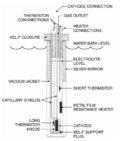A cold-core low, also known as an upper level low or cold-core cyclone, is a cyclone aloft which has an associated cold pool of air residing at high altitude...
17 KB (1,822 words) - 00:57, 12 September 2024
North Pacific, Northeastern United States and the northeast Atlantic. Cold-core low Cold pool Polar vortex Basque: tanta hotz; Catalan: gota freda; French:...
7 KB (769 words) - 12:12, 7 November 2024
Cut-off lows form in mid-latitudes (usually between 20° and 45°) and can remain nearly stationary for days. A cut-off low is a cold-core low where wind...
7 KB (818 words) - 04:34, 8 November 2024
Cyclone (redirect from Low-level circulation center)
[citation needed]. However, vigorous polar lows can be found over the Southern Ocean. During winter, when cold-core lows with temperatures in the mid-levels...
52 KB (5,138 words) - 03:08, 31 October 2024
Funnel cloud (redirect from Cold air funnel)
Cold Core 500-mb Lows". Weather and Forecasting. 21 (6): 1051–1062. Bibcode:2006WtFor..21.1051D. doi:10.1175/WAF967.1. Cooley, Jack R. (1978). "Cold Air...
13 KB (1,420 words) - 01:57, 10 October 2024
of low pressure. The largest low-pressure systems are cold-core polar cyclones and extratropical cyclones which lie on the synoptic scale. Warm-core cyclones...
34 KB (3,271 words) - 23:30, 14 October 2024
lows with extensive cumulonimbus clouds, which are often associated with cold pools in the mid- to upper-troposphere. During winter, when cold-core lows...
8 KB (957 words) - 02:22, 7 October 2024
below 6,080 metres (19,950 ft) in altitude, as it is an example of a cold-core low. A weak inverted wave in the easterlies is generally found beneath it...
13 KB (1,662 words) - 03:18, 29 September 2024
Tropical cyclone (redirect from Warm-core low)
area. A tropical cyclone is the generic term for a warm-cored, non-frontal synoptic-scale low-pressure system over tropical or subtropical waters around...
215 KB (20,942 words) - 02:28, 3 November 2024
Extratropical cyclone (redirect from Extratropical low)
center) to baroclinic processes. The low pressure system eventually loses its warm core and becomes a cold-core system. The peak time of subtropical cyclogenesis...
58 KB (6,061 words) - 08:25, 29 September 2024
Supercell (redirect from Low-topped supercell)
warm sector of a low pressure system propagating generally in a north easterly direction[globalize] in line with the cold front of the low pressure system...
55 KB (6,895 words) - 15:25, 2 November 2024
large region of cold, rotating air; polar vortices encircle both of Earth's polar regions. Polar vortices also exist on other rotating, low-obliquity planetary...
38 KB (7,304 words) - 03:57, 31 August 2024
outbreak and its costliest weather disaster on record. Spawned by a nearby cold-core low, successive hailstorms in Phoenix and surrounding locations on October 5...
32 KB (2,424 words) - 22:09, 11 October 2024
intensified two days later, reaching peak intensity on 7 November, due to a cold-core low aloft. Qendresa directly hit Malta in the afternoon and then crossed...
13 KB (1,244 words) - 20:15, 2 November 2024
Subtropical cyclone (section Upper-level low)
either cold core or warm core, and in 1972 this type of subtropical cyclone was ephemerally referred to as a "neutercane". Kona storms (or Kona lows) are...
36 KB (3,760 words) - 11:26, 17 October 2024
strength of the high-pressure system. When extremely cold air moves over relatively warm oceans, polar lows can develop. However, warm and moist (or maritime...
20 KB (2,054 words) - 19:28, 7 November 2024
cyclone couples with the upper-level trough or upper-level low, becoming increasingly cold core. The spin-down of cyclones, also known as cyclolysis, can...
26 KB (2,898 words) - 10:53, 4 November 2024
surface-based haze under their base. Anticyclones aloft can form within warm-core lows such as tropical cyclones, due to descending cool air from the backside...
19 KB (2,039 words) - 11:25, 4 November 2024
High can bring unusually cold weather into the tropics as far southeast as the Philippines. It may block or reduce the size of low-pressure cells and generate...
10 KB (1,069 words) - 13:30, 23 October 2024
term "cold fusion" in 1986 in an investigation of "geo-fusion", the possible existence of fusion involving hydrogen isotopes in a planetary core. In his...
144 KB (15,922 words) - 21:01, 5 November 2024
(15 mi) in size, and they would lose strength quickly after venturing into colder waters. The waters after a hypercane could remain hot enough for weeks,...
9 KB (913 words) - 17:11, 13 October 2024
always feature warm-core lows, polar lows are primarily cold-core. The prolonged life of medicanes and similarity to polar lows is caused primarily by...
138 KB (13,745 words) - 11:11, 2 November 2024
weather pattern that is as destructive as a hurricane, but which exhibits the cold-weather patterns of a winter storm. The Oxford English Dictionary has published...
7 KB (849 words) - 00:10, 11 October 2024
Kona storm (redirect from Kona low)
makes categorization of the systems not straightforward. Kona lows are typically cold core, making them extratropical cyclones. However, they generally...
8 KB (963 words) - 20:11, 4 August 2024
Mesocyclone (redirect from Low-level mesocyclone)
often associated with a local region of low-pressure. Their rotation is (usually) in the same direction as low pressure systems in a given hemisphere:...
14 KB (1,502 words) - 21:48, 12 August 2024
Nicorette approaching the NSW south coast tornadic waterspout. Pictures of cold-core waterspouts over Lake Michigan on 30 September 2006. Archived from the...
30 KB (2,961 words) - 07:39, 13 October 2024
Alberta clipper Cold-core low Panhandle hook Sudestada Winter storm Pacific Northwest windstorm Aleutian low European windstorm Polar vortex Cold wave Multi-Community...
43 KB (2,467 words) - 02:19, 23 July 2024
Occluded front (redirect from Cold occlusion)
mature low pressure areas. There are two types of front occlusions, warm and cold, depending on the temperature contrast: In a cold occlusion, the cold air...
4 KB (633 words) - 22:55, 15 October 2024
Hypothermia (redirect from Cold weather injuries)
hallucinating. Cold stress refers to a near-normal body temperature with low skin temperature; signs include shivering. Cold stress is caused by cold exposure...
60 KB (6,613 words) - 00:23, 25 October 2024
recorded low-pressure systems are fully cold core storms while the remaining third display hybrid features, which are defined by a warm core at lower...
28 KB (2,997 words) - 01:08, 12 September 2024


























